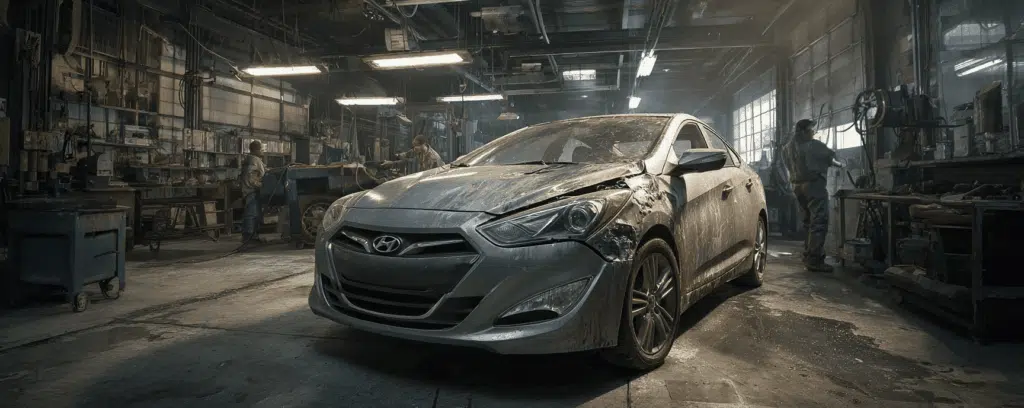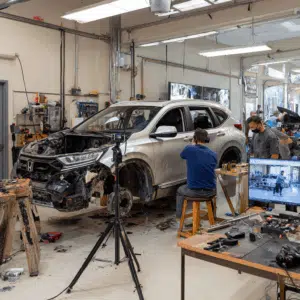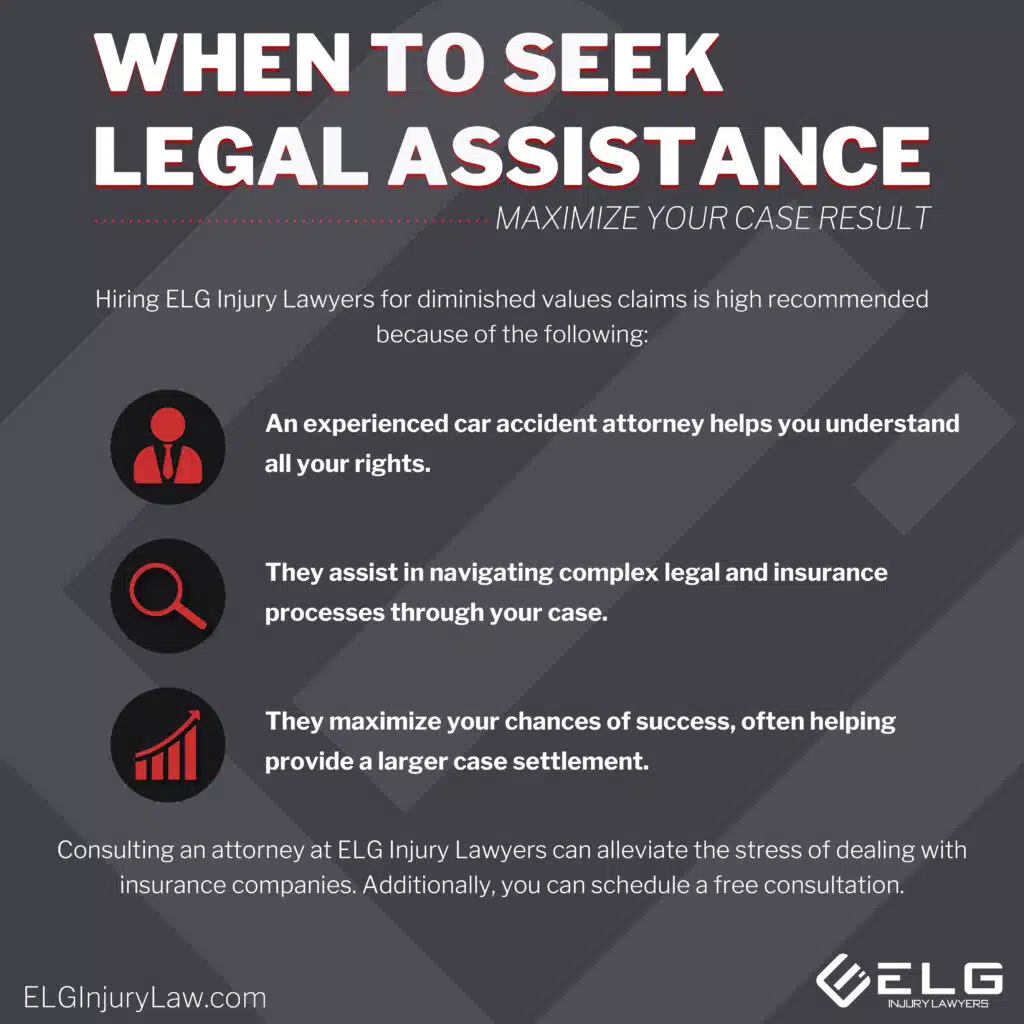
How much does an accident devalue a car? Generally, an accident can cause a car’s value to drop between 10% and 30% immediately. The exact devaluation depends on damage severity and repair quality. In this article, we’ll explore how accidents affect your car’s value both immediately and over time, and what you can do about it.
Key Takeaways
- A car’s market value can decrease by 10% to 30% immediately after an accident, regardless of repair quality.
- The vehicle’s accident history significantly impacts its long-term resale value, often leading to a reduction of approximately $1,700 compared to similar vehicles without an accident record.
- Diminished value claims can be categorized into immediate, repair-related, and inherent diminished values, with proper documentation and appraisals being essential for fair compensation.
Immediate Impact on Market Value
A car accident can cause a vehicle’s value to depreciate significantly the moment an accident occurs. This immediate diminished value is often a source of financial stress for vehicle owners. Regardless of how meticulously the car is repaired, it can lose between 10% to 30% of its value instantly due to car accidents.
The market value of a vehicle plummets after an accident, creating a lasting loss in its worth. This immediate devaluation can be particularly painful if you were planning to sell your car soon in the car’s market.
Understanding the factors that contribute to this depreciation can help you navigate the aftermath more effectively.
Factors Influencing Immediate Depreciation
Immediate depreciation is influenced by several factors, including:
- The severity of damage: Severe structural damage results in a greater loss of vehicle value compared to minor repairs.
- Repair quality
- The initial market value of the vehicle
The nature and extent of the damage are critical in determining how much a vehicle depreciates after an accident. A determined assessment of the pre-accident condition is essential for accurate evaluation.
High-quality repairs can mitigate some of the depreciation, whereas poor repairs can exacerbate it. Understanding these factors can help estimate the immediate diminished value more accurately.
Examples of Immediate Depreciation
To put things into perspective, a $20,000 vehicle could lose between $2,000 and $6,000 in value immediately after an accident. In more severe cases, the loss can be even higher, sometimes reaching up to 50% of the vehicle’s original value. For instance, a car suffering severe structural damage could see a dramatic drop in market value, losing thousands of dollars almost overnight.
Even minor accidents can lead to significant depreciation. For example, a vehicle involved in a minor fender-bender might lose around $500 or less in value. However, the presence of an accident history can still lead to a 10% to 30% decrease in the car’s overall value.
Long-Term Effects on Vehicle Resale Value
The long-term effects of an accident on a vehicle’s resale value can be profound. Even after repairs, an accident history can permanently affect the car’s market value. Consumers tend to pay less for vehicles with an accident history, impacting their resale value significantly.
Routine maintenance preserves the vehicle’s overall market worth and prevents additional value loss. Following the manufacturer’s maintenance schedule extends the vehicle’s lifespan and enhances its potential resale value.
Role of Accident History in Resale Value
Accident history is a crucial factor in determining a vehicle’s resale value. A vehicle may lose market value even after being restored to its pre-accident state. This reduction can occur despite the restoration efforts. Documents on the title indicating an accident can lower resale value and make selling the car more challenging.
Vehicles that have accident histories tend to sell for less. Specifically, they can go for approximately $1,700 less than comparable cars without such records. This long-term depreciation persists, highlighting the importance of considering accident history when evaluating a vehicle’s resale value.
Repair Quality and Its Long-Term Impact
The quality of repairs can significantly affect the resale value of a repaired vehicle after an accident. Choosing a reputable repair shop ensures that the repairs meet industry standards, which can positively affect resale value. On the other hand, poor repairs can lead to further devaluation and deter potential buyers.
Maintaining the structural integrity of a vehicle post-accident is vital to protect against further devaluation. Immediate action to address damage and keep the car clean helps maintain its value.
Let's Settle For More... Get Your FREE Case Review Today.
Let's Settle For More... Get Your FREE Case Review Today.
Types of Diminished Value Claims
Diminished value claims are essential for recovering losses from depreciation due to accident damage. There are three primary types of diminished value claims: immediate diminished value, repair-related diminished value, and inherent diminished value.
Knowing these different types of diminished value claims helps vehicle owners file the appropriate claim and seek fair compensation for their losses.
Immediate Diminished Value
Immediate diminished value refers to the loss in value that occurs right after an accident, regardless of subsequent repairs. If a car valued at $20,000 before an accident drops to $16,000 after repairs, the diminished value amount is $4,000.
A diminished value claim is based on the difference in car value before and after the accident and can be filed regardless of your intention to sell the car.
Repair-Related Diminished Value
Repair-related diminished value pertains to the reduction in value caused by poor-quality repairs following an accident. This concept emphasizes how repairs can negatively impact a vehicle’s worth. The quality of repairs is one factor that influences this type of diminished value. Other factors include the extent of damage and the vehicle’s title status after repairs.
A mismatch in vehicle color and panels can significantly reduce the car’s market value. Poor repairs can trigger a repair-related diminished value claim.
Inherent Diminished Value
Inherent diminished value refers to the adjusted value of a car after an accident, regardless of the damage severity. A vehicle involved in a severe accident is often seen as less valuable. This perception persists, no matter its current condition.
Filing a claim to recover the value difference caused by inherent diminished value is crucial for understanding the long-term financial impact of an accident on a vehicle when filing a diminished value claim.
Calculating Diminished Value

- Damage severity
- Repair quality
- Vehicle mileage
- Accident circumstances: To calculate diminished value accurately, it is essential to consider these factors.
Understanding these factors is crucial for vehicle owners seeking compensation or planning to sell a certain vehicle after an accident.
The 17C Formula
Insurance companies commonly use the 17C formula. It serves as a standard method for assessing the diminished value of a vehicle. Named after the lawsuit Mabry V. State Farm, this formula includes adjustments for damage severity and vehicle mileage.
A car valued at $30,000 pre-accident may have an initial diminished value calculated at $3,000 using this formula. Key documents for a diminished value claim include proof of the car’s pre-accident market value and evidence of diminished value post-accident.
Damage Multiplier and Mileage Multiplier
The damage multiplier adjusts the lost value according to the extent of damage. For example, a multiplier of 0.5 might be applied based on the severity of structural damage.
Insurance companies also use a mileage multiplier based on the vehicle’s mileage to further adjust the diminished value. High mileage can lead to a higher diminished value due to increased wear and tear on the vehicle.
Independent Appraisals
Engaging independent appraisers can provide a more equitable assessment of diminished value compared to standard insurance estimates. This ensures a fairer compensation for vehicle owners seeking to recover their losses.
Preventing Further Depreciation Post-Accident
Minimizing additional depreciation after an accident is crucial to maintaining a vehicle’s market value. Performing regular maintenance can significantly reduce additional depreciation by keeping the vehicle in optimal working condition.
High-quality repairs and routine maintenance help mitigate depreciation and maintain long-term market value. This involves immediate action to address damage and adhering to the manufacturer’s maintenance schedule.
Ensuring High-Quality Repairs
High-quality repairs can mitigate some depreciation, while poor repairs can exacerbate resale value loss. Choosing reputable repair facilities ensures that repairs meet standards, helping to maintain the car’s market value.
Selecting a reputable repair shop is essential because they provide expertise that enhances vehicle performance and longevity, ensuring a successful outcome and fair compensation for the site owner.
Regular Maintenance
Regular maintenance is crucial for preserving a vehicle’s market value, especially after an accident. Maintenance includes routine tasks such as oil changes, brake inspections, and tire rotations. Keeping up with maintenance can help mitigate depreciation and maintain market value long-term.
Periodic inspections identify potential issues before they lead to more serious problems.
ELG Injury Lawyers handle complex claims efficiently and negotiate with insurance companies. Their expertise benefits car owners by:
- fighting for victims’ rights
- seeking compensation
- investigating the accident
- gathering materials
- negotiating claims effectively as a car accident lawyer and car accident attorney.
Complex Cases
Complex cases involving significant damages or injuries can complicate diminished value claims, necessitating expert legal support. Legal help is crucial when claims involve inadequate repair payments or disputes over whether a vehicle should be considered a total loss.
When insurance companies undervalue vehicle damages, an attorney can provide an independent appraisal to support your claim.
Frequently Asked Questions
What is diminished value?
Diminished value is the decrease in a vehicle’s market value following an accident, even after it has been repaired. This reduction reflects the perception of the vehicle’s history and condition to potential buyers.
How is immediate diminished value calculated?
Immediate diminished value is calculated by assessing the difference between a car’s value prior to an accident and its value post-repair; for instance, if a car is worth $20,000 before an accident and $16,000 afterward, the immediate diminished value amounts to $4,000.
What factors influence repair-related diminished value?
Repair-related diminished value is primarily influenced by the quality of repairs, the extent of damage sustained, and the vehicle’s title status after repairs. Ensuring high-quality repairs is crucial to minimize depreciation.
Why is routine maintenance important after an accident?
Routine maintenance after an accident is crucial as it ensures the vehicle remains in optimal working condition, prevents further depreciation, and helps catch minor issues early. This proactive approach also maintains the vehicle’s market value.
When should I seek legal help for a diminished value claim?
You should seek legal help for a diminished value claim when there are complex issues, significant damages, or disputes with insurance companies. An experienced attorney can effectively guide you through the process and help secure fair compensation.
Related Articles
Can I Demand OEM Parts After an Accident? Your Rights Explained
Last updated Thursday, September 4th, 2025







